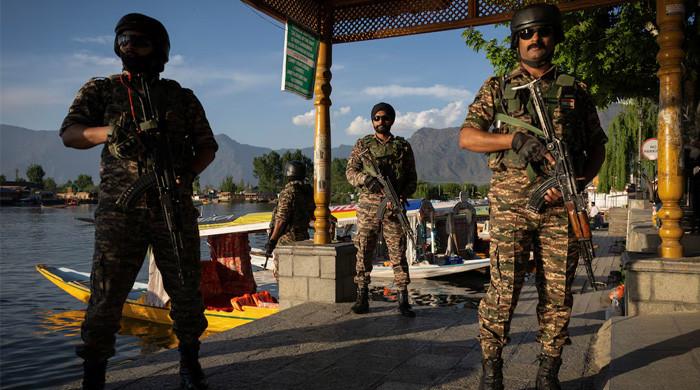India Seeks Global Support Amidst Rising Tensions with Pakistan
Following a tragic gun attack in Indian Illegally Occupied Jammu and Kashmir (IIOJK), India is actively engaging in a diplomatic push to garner international support. However, this effort appears focused on bolstering its justification for potential military actions rather than de-escalating the situation with Pakistan.
Despite limited definitive evidence directly linking Pakistan to the incident, a volatile confrontation between the two nuclear-armed nations is a growing concern, according to the New York Times.
The NYT report indicates that Indian Prime Minister Narendra Modi has urgently connected with numerous global leaders through diplomatic channels in the wake of the recent attack. Furthermore, officials have reported that representatives from a significant number of foreign missions were promptly called to the Ministry of External Affairs for critical briefings.
According to diplomatic sources, New Delhi’s primary aim seems to be building a case for potential military action against Pakistan, which it accuses of having connections to the attack, rather than seeking assistance to ease the tense stand-off. In a recent address, Modi pledged strong retaliation and the elimination of terrorist safe havens, without explicitly mentioning Pakistan.
In the occupied territory, Indian security forces have initiated extensive crackdowns, detaining numerous individuals as the search for the perpetrators continues.
Previously, India declared its intention to potentially disrupt water flow to Pakistan, which heavily relies on upstream rivers for its irrigation system. Additionally, they mandated the immediate departure of certain staff members from Pakistan’s diplomatic mission and Pakistani citizens visiting India.
Islamabad has responded by announcing its intent to suspend participation in bilateral agreements, including one pertaining to the “line of control” that demarcates the boundary between the two countries in the disputed regions, where a ceasefire has largely been maintained.
Growing anti-Muslim sentiment in India has also been reported, with Kashmiri students facing increased harassment in other Indian cities, leading many to consider returning home.
Five days after the attack, in which several civilians were killed, India has not publicly identified any specific group as responsible and has presented little concrete evidence to support its accusations against Pakistan. The Pakistani government has denied any involvement.
Indian officials, during briefings to diplomats at the foreign ministry, alluded to Pakistan’s historical support for groups targeting India, according to diplomatic sources. They stated that the investigation is ongoing and briefly mentioned technical intelligence, including facial recognition data, linking the perpetrators to Pakistan.
Analysts and diplomats suggest that the lack of substantial evidence could indicate that India requires more time to gather information or that it feels little need to justify its planned actions, given the current global landscape.
A military clash between India and Pakistan carries the risk of rapid escalation, potentially difficult to control. However, India appears largely unconstrained by global pressure and has become more assertive in recent years due to its growing diplomatic and economic influence.
While Iran and Saudi Arabia have engaged with both sides, and Iran has offered to mediate, the United Nations and the European Union have urged restraint and dialogue. However, major global powers are preoccupied with other crises, and some analysts suggest India may perceive expressions of support for its pursuit of justice as approval for any measures it undertakes.
Officials from the previous administration have voiced strong support for India’s efforts against terrorism. The former President has expressed friendship with both India and Pakistan, while acknowledging their long-standing disputes.
However, Washington’s level of involvement remains uncertain. The current administration has yet to appoint an ambassador to India, indicating its priorities in South Asia.
Experts suggest that even if external powers attempt to intervene, their influence might be limited, considering the history of conflicts between India and Pakistan over Kashmir.
The initial response mirrored the approach during the last major flare-up over Kashmir, highlighting a pattern of support for India, followed by pressure for restraint only after India takes action, according to analysts.
To compensate for past responses, there is a sense that India desires to do “something spectacular,” while Pakistan has pledged to retaliate to any strike by India.
Experts warn that the cycle of retaliation could escalate rapidly, with both sides overestimating their ability to manage the situation.
Unlike a previous incident, the claims of responsibility for the recent attack have been ambiguous, even regarding the exact number of attackers.
This lack of clarity may explain India’s focus on Pakistan’s “past patterns,” as mentioned in the report.
However, this approach, even before presenting evidence in private diplomatic discussions, has raised concerns, particularly considering the potential consequences of escalation.



Comments (0)
No comments yet. Be the first to comment!
Leave a Comment